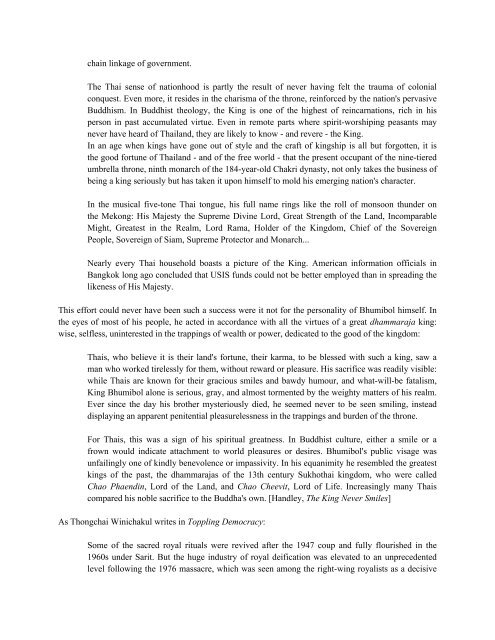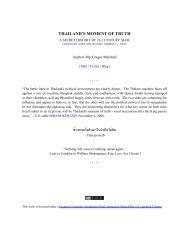THAILAND'S MOMENT OF TRUTH - ZENJOURNALIST
THAILAND'S MOMENT OF TRUTH - ZENJOURNALIST
THAILAND'S MOMENT OF TRUTH - ZENJOURNALIST
You also want an ePaper? Increase the reach of your titles
YUMPU automatically turns print PDFs into web optimized ePapers that Google loves.
chain linkage of government.<br />
The Thai sense of nationhood is partly the result of never having felt the trauma of colonial<br />
conquest. Even more, it resides in the charisma of the throne, reinforced by the nation's pervasive<br />
Buddhism. In Buddhist theology, the King is one of the highest of reincarnations, rich in his<br />
person in past accumulated virtue. Even in remote parts where spirit-worshiping peasants may<br />
never have heard of Thailand, they are likely to know - and revere - the King.<br />
In an age when kings have gone out of style and the craft of kingship is all but forgotten, it is<br />
the good fortune of Thailand - and of the free world - that the present occupant of the nine-tiered<br />
umbrella throne, ninth monarch of the 184-year-old Chakri dynasty, not only takes the business of<br />
being a king seriously but has taken it upon himself to mold his emerging nation's character.<br />
In the musical five-tone Thai tongue, his full name rings like the roll of monsoon thunder on<br />
the Mekong: His Majesty the Supreme Divine Lord, Great Strength of the Land, Incomparable<br />
Might, Greatest in the Realm, Lord Rama, Holder of the Kingdom, Chief of the Sovereign<br />
People, Sovereign of Siam, Supreme Protector and Monarch...<br />
Nearly every Thai household boasts a picture of the King. American information officials in<br />
Bangkok long ago concluded that USIS funds could not be better employed than in spreading the<br />
likeness of His Majesty.<br />
This effort could never have been such a success were it not for the personality of Bhumibol himself. In<br />
the eyes of most of his people, he acted in accordance with all the virtues of a great dhammaraja king:<br />
wise, selfless, uninterested in the trappings of wealth or power, dedicated to the good of the kingdom:<br />
Thais, who believe it is their land's fortune, their karma, to be blessed with such a king, saw a<br />
man who worked tirelessly for them, without reward or pleasure. His sacrifice was readily visible:<br />
while Thais are known for their gracious smiles and bawdy humour, and what-will-be fatalism,<br />
King Bhumibol alone is serious, gray, and almost tormented by the weighty matters of his realm.<br />
Ever since the day his brother mysteriously died, he seemed never to be seen smiling, instead<br />
displaying an apparent penitential pleasurelessness in the trappings and burden of the throne.<br />
For Thais, this was a sign of his spiritual greatness. In Buddhist culture, either a smile or a<br />
frown would indicate attachment to world pleasures or desires. Bhumibol's public visage was<br />
unfailingly one of kindly benevolence or impassivity. In his equanimity he resembled the greatest<br />
kings of the past, the dhammarajas of the 13th century Sukhothai kingdom, who were called<br />
Chao Phaendin, Lord of the Land, and Chao Cheevit, Lord of Life. Increasingly many Thais<br />
compared his noble sacrifice to the Buddha's own. [Handley, The King Never Smiles]<br />
As Thongchai Winichakul writes in Toppling Democracy:<br />
Some of the sacred royal rituals were revived after the 1947 coup and fully flourished in the<br />
1960s under Sarit. But the huge industry of royal deification was elevated to an unprecedented<br />
level following the 1976 massacre, which was seen among the right-wing royalists as a decisive




